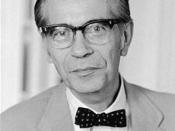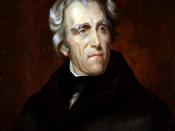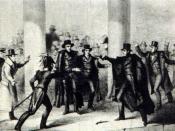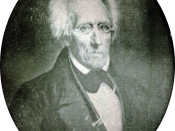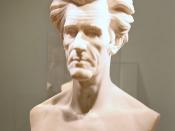Andrew Jackson and the Rise of Liberal Capitalism" Richard Hofstadter starts out by saying that in the early 1820's, all of the government and political leaders were "encrusted in their posts." He said that everybody basically had been in one specific position most of their political lives, and there was nobody new, who might have been better suited for the job. Jackson had made a new breed of politician, when he enabled all white men to vote. It made for a politician that was forced to appeal now to the higher class, as well as the lower class. So, they weren't only appealing to the landowners any more. Then, as the western progression was at its peak, everybody was buying large quantities of land, spending all of their money, and taking out large loans from the bank. That caused a large depression because there wasn't enough money issued to pay back the debts, and the "banks were forced to press their debtors to the wall".
Jackson had his beliefs for many reasons. Firstly, he grew up in Jeffersonian times. So, he was against banks, public debts, paper money, and high tariffs. Early in his life, he lost his entire fortune due to the corrupt paper money, and was forced to work extremely hard to regain it. So, he was against all paper money.
Because of Jackson's administration, everybody became obsessed with their jobs, and they almost became their religions. He had seen most things from every point of view, because he was in every situation. From rich to poor, from laborer to land owner, he had seen it all. So, he knew how to react to every situation.
While trying to renew the bank charter, Biddle tried to convince Jackson that the bank was good. He tried to fix all of its problems, and prove that it was worthy, but nothing worked. Jackson knew that the bank was corrupt, because foreigners held ü of its stock, and the rest was controlled by a small percentage of wealthy upper class people, or the elite, which was exactly what he hated and wanted to abolish.
The only thing that Jackson wanted was not a Utopia, but a bourgeois society, where the middle class ruled. But, when he withdrew all of the government's accounts and placed them in state banks, he caused a depression from the national bank, and the state banks all gave out more credits than they had money, so it cause two wide scale depressions. When New York made laws that would enable free banks, with restrictions, it was know as a very wise idea, and became a precedent for most of the other states.
Jackson's administration started out with breaking the old chains of politics, by introducing new people and ideas. And he also broke the economic privileges of the upper class, by raising up the middle and lower classes. He is basically what started America being known as a "self-made" country.
I think that Hofstadter is right on most of the issues that he brought up. Jackson did bring for the uprising of the middle and lower classes, by enabling all white men to vote, by eliminating the economic privileges that the elite had, and by striking many landowners with hard tariffs to lower the amount of both slave income and elite families, Also, Jackson did lead on many large depressions. First was when the west was opened up for exploration. Everybody spent all of their money, and the banks money, in order to get a piece of land to sell for higher prices, but was never able to actually pay of their debts back to the bank. That led the first depression. The next depression he led was when he withdrew all of the government's funds from the national bank. The entire bank collapsed, destroying anybody or anything that still had some money in it. The last major depression he led was when he put all of the funds in small state banks. The state banks then issued more credits than the money that they actually had to back it up, which cause a major depression.
Lastly, Hofstadter says that Jackson led an economic and political revolution. The political revolution was rather small, because all he did was add some new faces in, and rearrange it so that there wasn't as much governmental power, but more state power. The more significant revolution was the economic revolution. It wasn't entirely of his bringing, but he did support it. When travel became easier, he helped to make it possible for new highways, railroads, and bridges to be made with healthy competition so that they maintained their organization. Also, he eliminated the elite class, which gave the lower class a chance to progress, and the middle class the chance to be strengthened.
All in all, Jackson had an amazing administration, and Hofstadter did a great job of explaining it.
